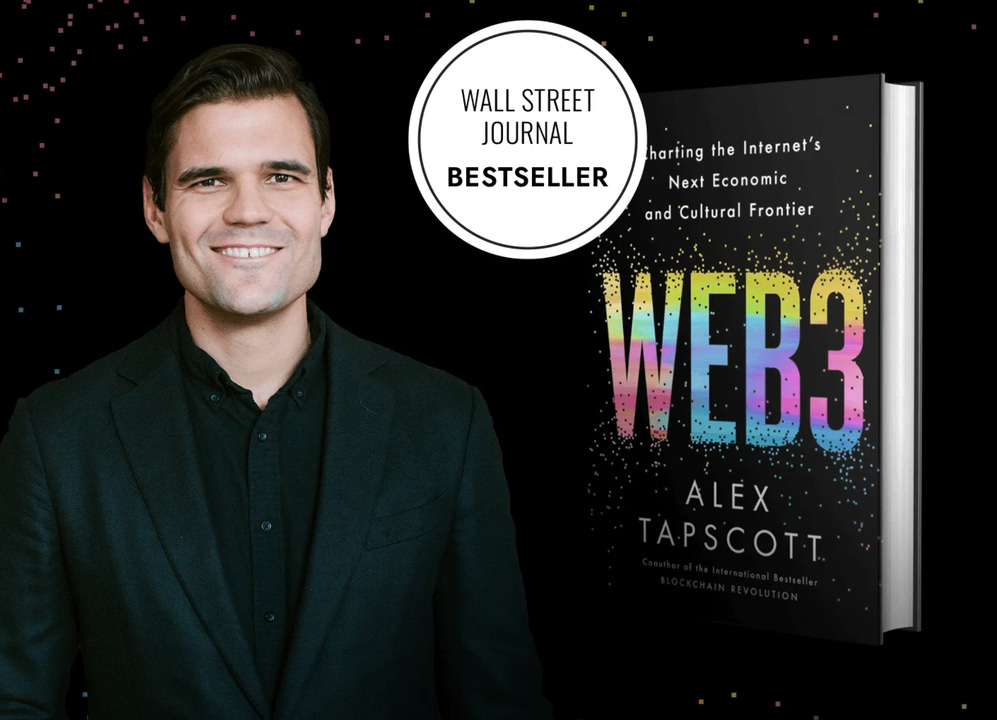By Diamond Michael Scott, Independent Journalist and Curator of New Economy Great Books
Alex Tapscott’s Web3: Charting the Internet’s Next Economic and Cultural Frontier is more than a book — it’s a manifesto for the digital transformation ahead.
Building on the insights of his bestseller Blockchain Revolution, Alex offers a guide to navigating the complexities of the decentralized internet, where trustless systems redefine interaction and collaboration.
Web3 shifts the paradigm from the “Read-Write Web” to the “Read-Write-Own Web,” introducing trustless interactions that allow parties to engage with technologies like blockchain.
Alex illuminates how this evolution empowers individuals, redistributes ownership and reshapes societal structures. These themes resonate with the mission of the Dave Alexander Center for Social Capital, which champions people-centric strategies and elevates human connection.
Web3 and the Evolution of Trustless Interactions
Alex contextualizes the internet’s transformation, highlighting the limitations of the “Read-only Web” and the vulnerabilities of centralized platforms in the “Read-Write Web.” These centralized entities profit from user data while exposing consumers to exploitation and cyberattacks.
Web3 introduces decentralization, creating an internet governed by its users. By leveraging blockchain technology, trustless systems enable peer-to-peer transactions that rely on cryptographic security and smart contracts — automated agreements that eliminate intermediaries. This trustless foundation ensures transparency, immutability and authenticity.
Alex compares blockchain’s potential to double-entry bookkeeping’s historical impact, noting how it redefined commerce. Similarly, Web3 could transform business, financeand culture through decentralized, tokenized systems that allow ownership and value transfer without intermediaries.
Key Technologies Empowering Decentralized Interactions
Alex explores Web3’s foundational components, including:
• Smart Contracts: Automating processes to execute predefined conditions securely and efficiently.
• Non-Fungible Tokens (NFTs): Redefining intellectual property and enabling provable ownership of digital assets.
• Decentralized Finance (DeFi): Providing financial services without traditional banks, fostering inclusion.
• Decentralized Autonomous Organizations (DAOs):Democratizing governance through community-driven decision-making.
• Self-Sovereign Identity: Giving individuals control over their personal data.
• Interoperability: Enabling seamless interaction between different blockchain networks.
These technologies embody decentralization, reducing single points of failure and shifting power to users. Tokenization further enhances this ecosystem by allowing trustless ownership and exchange of assets, empowering individuals to maintain control over their data and assets.
Web3’s Alignment with Social Capital
The principles of Web3 align with the Dave Alexander Center for Social Capital’s philosophy where the aim is to foster transparency and accountability, creating opportunities for organizations to engage stakeholders authentically.
By integrating Web3 frameworks, businesses can build trust through decentralized models like DAOs, which democratize decision-making.
Imagine companies leveraging blockchain to establish transparent supply chains or employing cryptographic security to safeguard customer data. Such innovations not only enhance operational integrity but also align with the Center’s belief that human connection is the ultimate business asset.
Challenges and Opportunities in Scaling Web3
While Web3 presents immense potential, Alex acknowledges challenges like scalability, regulatory ambiguity and technological adoption. However, these hurdles are opportunities for innovation, requiring collaborative efforts to bridge ideals and practical application.
The Center for Social Capital could play a pivotal role by advocating trustless technologies that enhance social capital. For instance, DeFi platforms could provide financial access to underserved populations, and tokenized systems could create equitable models for value exchange.
Charting a Trustless Future
Web3 represents more than a technological shift. Rather, it’s a call to action for leaders to embrace decentralized, trustless systems that prioritize collaboration and connection. Tapscott’Ts vision underscores the transformative potential of trustless interactions to redefine societal structures and foster shared value.
For the Dave Alexander Center for Social Capital, Web3 offers a roadmap for integrating these principles into leadership practices, inspiring a new wave of innovation rooted in trust and transparency. By empowering individuals through user control and decentralized governance, Web3 champions a more humane and equitable digital future.
In Web3: Charting the Internet’s Next Economic and Cultural Frontier, Alex delivers a compelling vision of how trustless systems will drive progress. For those ready to embrace this change, Web3 offers the tools and philosophies to build a world where ownership, connection, and trust are paramount.
Key Terms for Web3
Trustless: A system that doesn't rely on trust between parties to function. Instead, these systems use cryptographic verification and consensus mechanisms to ensure the security and integrity of transactions.This allows people to interact with a system without a central authority or intermediary, such as a bank or broker.
Blockchain technology: A digital ledger that ensures transparency and immutability, forming the foundation of trustless interactions.
Smart contracts: Self-executing agreements that run automatically when predefined conditions are met, removing the need for intermediaries.
Decentralization: A system that distributes control across a network rather than centralizing it, reducing vulnerability to single points of failure.
Cryptographic security: Advanced encryption techniques that protect transactions and data, ensuring integrity and preventing fraud.
Peer-to-peer transactions: Direct exchanges between users without the need for a central authority or middleman.
Tokenization: The process of converting assets into digital tokens, enabling secure and trustless ownership and value transfer.
Interoperability: The ability of different blockchain systems to communicate and work together, broadening the potential of trustless systems.
User control: A feature of Web3 that gives individuals full control over their own data and assets, minimizing risks of misuse.
Real-world applications: Practical uses of trustless systems, such as decentralized finance (DeFi), non-fungible tokens (NFTs) and transparent supply chains.





